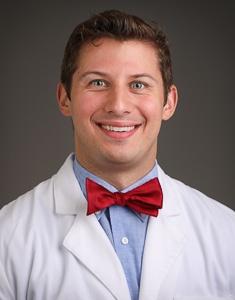
When Charles “Hunter” Roark, DO, came to Duke last year, he wasn’t expecting to have to adjust to an unexpected global pandemic in addition to his internal medicine residency. Now as a Junior Assistant Resident, he’s bringing the foundation in general medicine, experience in working with patients, and practice using personal protective equipment (PPE) to his training as a Duke Neurology resident. In this week’s Spotlight interview, Roark talks to us about his experience as a first-year resident, the intellectual and emotional factors that drew him to the field of neurology, and how he maintains work-life balance as a resident and parent.
My year as an internal medicine resident was difficult, but provided a great environment to grow. It built a general foundation in a broad range of medical specialties. Something that stands out to me from my year in internal medicine is the face-to-face interactions with patients, whether happy or sad. There were times when patients hugged me, and times where we cried together at their bedside regarding diagnoses.
How did the COVID-19 pandemic affect your PGY1 year? What's one positive resource or strategy that's helped you cope either professionally or personally?
There was (and still is) an ambience of soberness and some anxiety throughout the hospital. We all know that there is a serious novel disease spreading, but we all want to help in any way that we can to keep people safe. To cope, Duke’s internal culture and habits provide support and reassurance. Namely, caring program leadership, proper PPE, and a back-up workforce in case you get sick to name a few.
How and when did you first become interested in neurology? What interests you the most about the field?
I studied neurobiology in college and since then it was always in the back of my mind. During medical school, neurology, for me, was the best combination of pathology, patient interaction, and ample opportunity for a career in any sub-specialty of the field. What interests me most about neurology is central nervous system pathology and how we can target disease on a molecular level. I’m not sure what area within neurology that I will pursue, but it’s exciting to know that new medicines and therapies are constantly being made available for patients.
You completed your first year of residency during a pandemic and as a new parent of two. What's one work-life balance strategy that you've found helpful?
Have a spouse that is willing to support you! In all seriousness, my wife is the real reason we manage between marriage, kids, and work. Something that I do is always separate work and home life. I never bring any work to do home (notes, studying, etc) if possible and that way, when I’m home, I can devote my attention to my wife and kids.
What are you looking forward to the most about your residency experience?
I am very excited to start my years in neurology. I am looking forward the most to learning enough to make a lasting impact on patients’ lives. The quicker and more accurate I can make diagnostic and treatment decisions, the faster a patient can receive care and relief.
What other passions or hobbies do you have outside of the Department?
I am passionate about fitness and exercise. My wife and I enjoy being outdoors, especially swimming, hiking, and biking. I also enjoy tinkering with computers and playing games on my PC.

Roark enjoys the forests of Kentucky with his children in this photo.